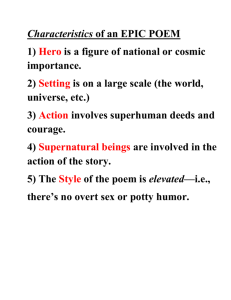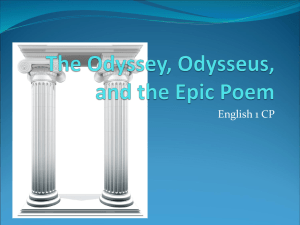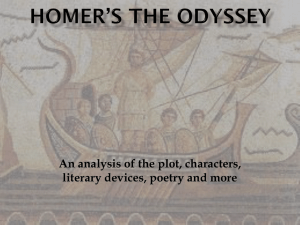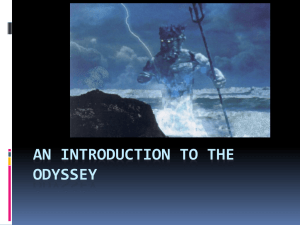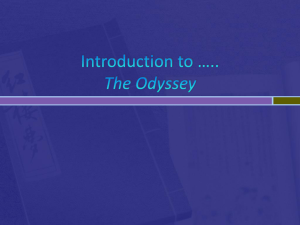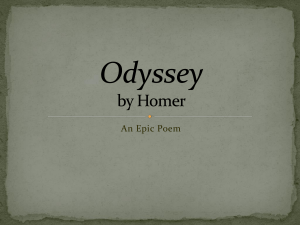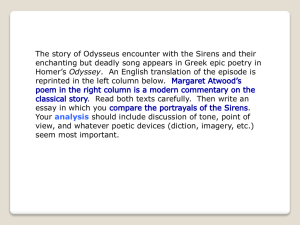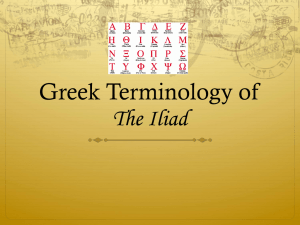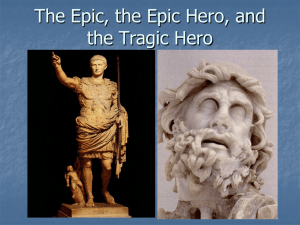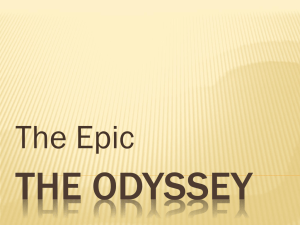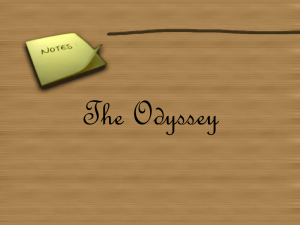Intro Powerpoint for The Odyssey
advertisement
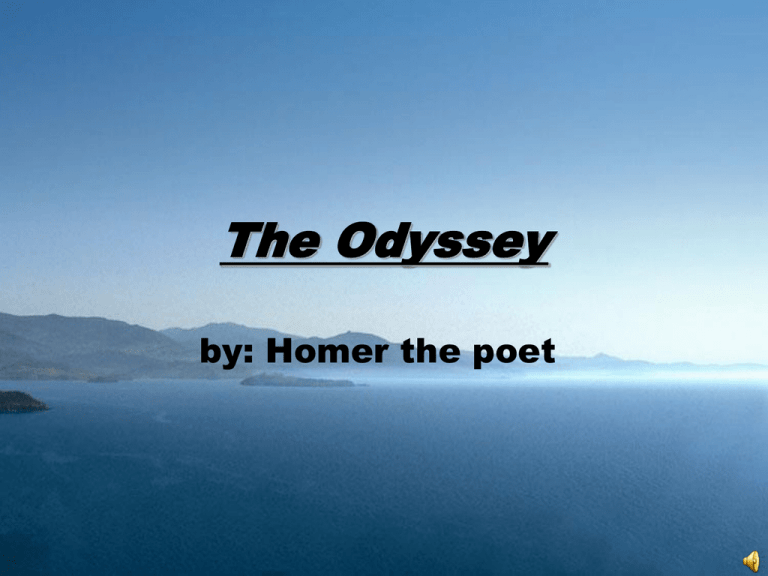
The Odyssey by: Homer the poet Homer • Homer was a man’s name, and not the Greek equivalent of ‘anonymous’ and that is the one certain fact about him. • There are legends of Homer as a blind, wandering poet/minstrel. • No reliable info is available about Homer and he is considered mostly legend. The Iliad and The Odyssey were probably part of an oral tradition composed by many over a long period of time. Who was Homer? • Who he was, where he lived, and when cannot be answered with any certainty. • In ancient times seven different cities claimed to have been the birthplace of Homer. • he was likely a native and resident of some area of Asia Minor (western Turkey) because the dialect in which the poems were composed is that of the Ionian Greeks. Modern Day Allusion Who was Homer? • Ancient Greek tradition as well as a study of the language and style of the poems suggests he lived around the 8th century B.C. • The composition of the Homeric epics, The Iliad and The Odyssey, was probably sometime around 750 BC History & Literature • Trojan war in Iliad/Odyssey about 1200 B.C.E – 10-year Greek attack and siege of the city of Troy in northwestern Asia Minor • In between 300 years of “dark ages”- Hellenic “Greece” sacked by tribes with no written language • Illiad/ Odyssey important W.European work – 1st complete character arcs-growth/ full plot Introduction • The Odyssey of Homer is the second great work of western literature , The Iliad, also attributed to Homer, being the first. • The Odyssey is a Greek epic poem, more than twelve thousand lines in length, divided into 24 books (chapters). Geography/ politics • location of the The Iliad and The Odyssey is the Aegean Sea, The Ionian Sea and parts of Turkey. For discussion/ thought • People debate whether Homer was real person or just a made up figure. Assuming he wasn’t “real” why might people have invented an author for The Odyssey and The Iliad? • Why would they have added details to his biography, such as blindness? Why read Homer? • These two epic poems are the most important works of non-dramatic literature surviving from ancient Greece. • They are part of and intertwined with the Western literary canon so that knowledge of them = cultural literacy: knowing about these can help you to understand Shakespeare and Dante and Joyce and Rowling. The nature of Greek oral epic • The Odyssey is an epic in the style of oral poetry, composed to be read aloud. • The origins of the tradition are lost, but probably go back to Mycenaean times (c1400-1200 B.C.) What is an epic poem? • An epic poem is a narrative poem on the grand scale and in majestic style concerning the exploits and adventures of a superhuman hero engaged in a quest or some serious endeavour. • The hero is distinguished above all men by his strength and courage, and is restrained only by a sense of honour. Elements of epic poetry • The subject matter of epic includes myth, legend, history, and folk tale • It is set in a heroic age of the past and embodies its country’s early history and expresses its values • Battles and perilous journeys play a large part, as do gods, the supernatural and magic; scenes are often set in the Underworld or in heaven Characteristics of the Epic – – – – – – – Long story Deeds of a hero Determines fate of a whole people Begins in medias res [middle of action] Involvement of the gods Magic or supernatural events Characteristics of oral tradition [like repetition] – Beautiful Language [often verse] Characteristics of Epic Poems • The main character or protagonist is heroically larger than life • The deeds of the hero are presented revealing his failings as well as his virtues • The action, often in battle, reveals the morethan-human strength of the heroes as they engage in acts of heroism and courage • The setting covers several nations, the whole world, or even the universe Characteristics of Epic Poems • The episodes, even though they may be fictional, provide an explanation for some of the circumstances or events in the history of a nation or people • The gods and lesser divinities play an active role in the outcome of actions • All of the various adventures form an organic whole, where each event relates in some way to the central theme • Invocation to the muse or other deity Characteristics of Epic Poems • Long, formal speeches by important characters • Frequent use of epithets: • repetitious adjectives that are connected to various people, places and other ordinary nouns. • tell the listener of the important and permanent qualities of characters or elements, for example: - resourceful Odysseus wise Penelope thoughtful Telemachus bright-eyed Athena wine dark sea rosy-fingered dawn Epic Hero • The central hero of an epic • larger-than-life powers. Achilles fulfills this role in The Iliad; Odysseus in The Odyssey. • Imperfect or flawed: Achilles is stubbornly proud over a long period of time; Odysseus has lapses in judgment. • abundance of courage, a fighting spirit that endears them both to the reader (listener) and the gods. • Who are other epic heroes (from Star Wars, Harry Potter, Lord of the Rings)? Elements of the Epic Hero Cycle • The main character is a hero, who is often possessed of supernatural abilities or qualities. • The hero is charged with a quest. • The hero is tested, often to prove the worthiness of himself and his quest. • The presence of numerous mythical beings, magical and helpful animals, and human helpers and companions Some major motifs also found in HP novels • Fate/prophecy • Retribution • Confrontations with death (the Underworld) and conversations with the dead • Series of tests, including battles with monsters, are part of a lengthy journey ending with home, family, and stability • Hero’s P.O.V. Contemporary expressions originating from the text • • • • • • • Herculean Mentor Spartan The face that launched a thousand ships A temptress, a siren The threads of destiny museum View of the gods • Arbitrary--punish or reward as they feel they’ve been wronged or honored • Not all powerful– they debate on Mt. Olympus & don’t always know everything that happens • No one god in charge--even Zeus must accommodate other gods when they get angry • Do care for humankind--Odysseus has suffered enough • They are shapeshifters View of Man • Man must worship and obey the gods • A son must earn his own reputation— Telémachos must become his own hero • Men want women for their beauty, sexuality, possessions • Men are basically physical--eating, drinking, lusting, fighting, competing • Man is at least partly responsible for own fate View of Women • Possessions--responsibility of their fathers, then husbands, then sons. Every woman categorized as “maid,” “wife,” “widow,” or “whore.” • Powerless • Must scheme to survive • Penelope smarter than average--has outwitted suitors for nearly 10 years Gender Complexities • Athena appears to Telémakhos as a man, partly to hide her godhood, partly because a man could move freely within Akhaian society • As a “father,” she makes a man of him-urges him to seek his father’s fate and to fight his mother’s suitors • Until then, Telémachos has been “emasculated” A short plot summary: The Iliad is about the Trojan War and The Odyssey is about how a hero of the war, Odysseus, takes ten years to get back home after the war has ended and about the adventures he has along the way. The Man Odysseus • “no mortal half so wise” (85) – His wisdom hasn’t protected him from grief and harm – How wise is he, really? • LOOK FOR EVIDENCE FOR OR AGAINST O’S WISDOM THROUGHOUT EPIC • A brilliant schemer--note all ways Homer has of saying this The Beginning (1 mintue and 14 seconds so listen to all of it) • The Odyssey begins in medias res: – the plot begins in the middle of the overall story – prior events are described through flashbacks or storytelling. • Odysseus (Latin: “Ulysses”) has just fought in the Trojan War and is weary of war. All he wants to do is to go back to Ithaca and his beloved Penelope. …However, the gods have other plans for this trickster king. THE END Thank you for being here for the Odyssey. Good-bye and good night! (or day, depends on the time.)
